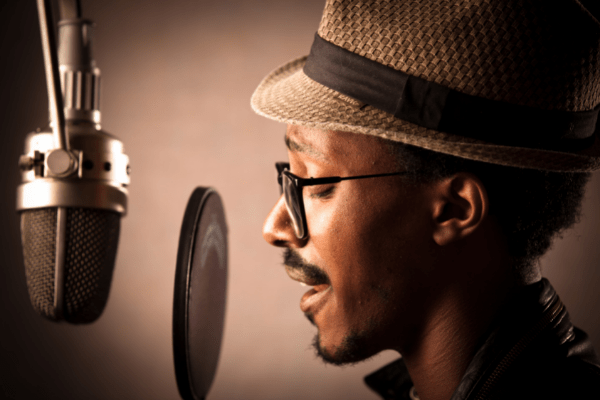Anyone who’s tried to record vocals knows that it’s much easier said than done, especially recording yourself. Many factors go into recording good vocals, and they’re not always readily apparent. But what are these factors, and why is it so hard to record good vocals?
It’s hard to record vocals for many reasons, including poor room acoustics, microphone placement, poor microphone quality, popping, sibilance, and proximity effect. They can negatively impact a recording, but using microphone techniques, improving your acoustics, and utilizing a pop filter can help.
In this article, I’ll be going over the many factors that can make recording vocals difficult, as well as tips to help improve your process and results, whether you’re recording your own vocals or doing it for someone else.

 Why Do My Vocals Sound Bad?
Why Do My Vocals Sound Bad?
Your vocals may sound bad because of several well-known factors. But your vocal recordings not sounding as good as you hoped or expected are common problems many others also run into early in their careers.
You Aren’t Used to Your Own Voice
A common phenomenon is that our own voices sound very strange and foreign to us when presented in a recording. This is because our skull, bone, and other tissue in the body make our voices seem to reverberate, so to our own ears, our voice sounds deeper and ‘richer’ than how we sound in recordings.
If you’re recording yourself and having trouble pinpointing why the recording seems off, maybe it isn’t, and you aren’t used to your own voice. Of course, this probably isn’t the case if you’ve spent a little time recording yourself, but it’s a common enough issue for beginners.
The Room Isn’t Suitable for Vocal Recording
Not every room is created equally for recording purposes. Ideally, you’d have a dedicated studio that’s been treated and customized for the purpose, but of course, not everyone has that luxury.
In that case, you’d be using a room in your home. Rooms with lots of hard surfaces create high amounts of reverb, and those with too much soft material (beds, pillows, etc.) can suck the sound out of a room and essentially muffle vocal recordings.
The Microphone Placement Is Wrong
Even with a good room for recording, having the microphone in certain positions can drastically alter the tone of vocal recordings and add in lots of weird reverb. Ideally, you want your microphone to be as far from the walls as possible without actually being in the center of the room. This isn’t as complicated as it sounds, only requiring some experimenting to find your room’s ‘sweet spot.’
You Need a New Microphone
A new microphone could be just what you need to instantly make a huge difference in the quality of your vocal recordings if there aren’t any other problems. Old microphones lack the sensitivity and sophistication of modern microphones, especially omnidirectional mics.
While omnidirectional microphones are incredibly useful for recording vocals, they’re extremely sensitive and will pick up virtually every sound in every inch of a room. If you don’t have your room’s acoustics
exactly how you want them, it’s best to do that before getting a new microphone, or else it won’t help as much as you’d hope.
Check out: Are USB Microphones Good For Recording Vocals?
Popping and Sibilance Occur
The human voice does weird things that we don’t notice in day-to-day life, including:
- Popping: This is a phenomenon where you emit a blast of air when pronouncing the letters p and b. Try putting your hand over your mouth when saying ‘pepper’ or ‘blast’ to see what I mean. Microphones not only pick up sound, but this air moving into the mic as well.
- Sibilance: This is a similar effect when pronouncing the letters s and f. Rather than a blast of air, you unknowingly let out a high-frequency noise that is easily picked up by microphones because of how highly sensitive they are. It’s a kind of ‘hiss’ that you may have heard in recordings before.
Proximity Effect Occurs
A common problem often encountered with cardioid microphones is the proximity effect. When a source of sound comes close to the microphone, it boosts the low-frequency response of the recording. In some cases, this can be desirable, such as when recording acoustic instrumentals or when used judiciously for vocals.
Beginning vocalists may not be aware of how close they are to the microphone, which can cause this effect, along with other accidental effects I’ll be discussing in later sections.
Tips for Recording Better Vocals
Thankfully, most common problems facing artists and producers have been identified, mitigated, and even fixed. Some of these can be as simple as technique, and others require a significant time or monetary investment.
Use Microphone Techniques
Microphone technique is an area that any vocalist will continuously improve upon over the course of their whole career. The primary factors of microphone technique that affect how vocal recordings turn out are:
Distance
Distance from the microphone completely changes the tone of the resulting vocals. Unfortunately, many novice vocalists don’t pay much attention to it, and their vocals suffer as a result. A good place to start with distance is to start 6 inches (15.24 cm) away from the mic.
Farther away creates a more open and airy sound, while closer makes the vocals more ‘close’ and intimate. Experimentation is key to get the tone you’re looking for in the recording.
Height
Height doesn’t seem as important as distance, but it actually works in concert with distance to enhance the recording. Keeping the lips even with the microphone is considered standard, while lowering the microphone will increase how prominent the lower-end of the voice sounds. So, it may help lower the mic toward the chest by a few inches for boomier vocals.
Use Effects While Recording
This is a controversial tip because many people will actually advise just the opposite, and for a good reason. Using effects while recording can distort the singer’s expectations because it makes the recording sound better than it actually is. However, the confidence boost of hearing the recording can, ironically, make them perform better.
It’s also somewhat akin to a crutch for beginners to use effects while recording – useful but harmful if in excess. Experienced singers don’t need to use effects while recording, and beginners would most benefit from learning with minimal effects.
Improve the Room’s Acoustics
The best way to improve a room’s acoustics is to use acoustic panels. A common problem with many household rooms is that they’re too ‘hard,’ which creates much reverb in any recordings. This is where acoustic panels come in. Or, if you’re on a budget, silicone or fiberglass panels will do.
You’ll need to cover the entirety of the room in panels, but if you can’t do the ceiling for some reason, just the walls will do. Proper acoustic insulation will help mitigate the downsides of recording in a home space rather than a professional setting. This will make your recordings sound more professional than someone recording in their garage without consideration for acoustics.
Utilize a Pop Filter
Pop filters are a simple and easy way to minimize the impact of popping and sibilance in your recordings. Thankfully, they’re relatively cheap (for audio equipment) and easy to install. The difference will be night and day for your recordings.
Final Thoughts
While there are a number of factors such as poor acoustics, microphone placement, and others that can ruin good recordings, they aren’t insurmountable. With lots of patience, effort, and perhaps a little money, you can make your recordings sound very close to professional.
Sources
- Landr: Recording Vocals At Home: 9 Big Mistakes and How To Avoid Them
- E-Home Recording Studio: Acoustic Treatment 101: The Ultimate Guide For Home Studios
- E-Home Recording Studio: How To Record Better Vocals: The Beginner’s Guide
Recent Posts
QuickTime is a vital app for many Mac users, and if you’ve recently bought a new microphone, you might wonder how to use it optimally. QuickTime cannot record audio content if it doesn’t have...
Every microphone leaves a unique signature on the quality of its output. If you’re a podcaster trying to melt your way into your audience’s hearts, a muddy, distorted recording won’t cut it....
